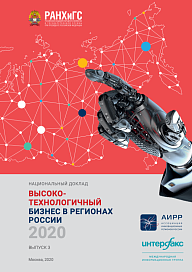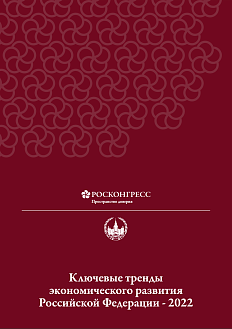The National Report on the development of high-tech business in Russian regions was prepared by specialists from the Russian Academy of National Economy and Public Administration under the President of the Russian Federation (RANEPA) and the Association of Innovative Regions of Russia (AIRR) in cooperation with the Interfax Group. The Report was presented for the first time at the Gaidar Forum in 2018. The High-tech business in the regions of Russia, National Report for 2019, you can see in the Analytics section of the ROSCONGRESS.ORG Information and Analytical System.
Roscongress Foundation analysts highlighted the main theses of this research, accompanying each of them with suitable fragments of video broadcasts of panel discussions held as part of business programs of the key events hosted by the Foundation.
The largest contribution to the development of high-tech business in Russia is made by Moscow, St. Petersburg and the Moscow Region, accounting for about 38.3% of the total assets of high-tech business in Russia.
The high-tech sector makes the most significant contribution to the development of a region directly through the gross added value created in a region. The structure of the high-tech sector’s revenue is dominated by the manufacturing sector (mechanical engineering, chemistry, drugs and medical instruments, the automotive industry and electrical equipment).
Regions with a developed manufacturing industry are leading in terms of the share of high-tech, medium-tech (high-level) and science-intensive activities in the gross regional product.
The export of high-tech products is the most important result of the high-tech business in a region, primarily because export abroad to a certain extent guarantees the real products competitiveness.
The main social risk in the digital economy development in Russian regions is an increase in labor productivity, which is why jobs that do not meet high requirements are lost. Due to the dominance in the regional economy of the public sector, raw materials industries, high business costs, lack of training of specialists with in-demand competencies and other factors, such risks are only increasing.
High-tech companies are a significant source of high-productivity jobs, which reflects their important social role in a region’s economy. The problem is that due to the desire to increase labor productivity, the high-tech sector of the economy is losing some jobs. In Russia, at present, positive growth was observed only in 30 regions. In 10 leading regions, 56.2 thousand jobs were created, i.e. about 65.3%.
The regions of Russia with the highest vulnerability include the least developed territories — the republics of Ingushetia, Chechnya, Dagestan, Karachay-Cherkessia, Kabardino-Balkaria and Tyva. They are characterized by a significant share of highly automated activity types (trade, agriculture, transport), and the economy in them is largely of a shadow nature.
A strategic initiative in terms of adapting to risks of the digital economy is a significant expansion of the information and communication infrastructure; an increase in corresponding capabilities of the education system; more active use of scientific and technological potential and the creation of conditions for entrepreneurship.
The main result of the regional innovation policy is the growing contribution of the region’s high-tech sector to Russia’s development. Target guidelines for state incentives for high-tech and knowledge-intensive industries in Russian regions should differ significantly depending on the region type (the level of entrepreneurship and innovation ecosystem development) and the supported project type.
Opportunities for retraining and job creation in Russia do not match the pace of digital transformation acceleration. Certain prospects for employment maintaining are associated with retraining in specialties from the STEAM category, which are less susceptible to automation than others.
Promising conditions for new industries creation (primarily information technologies), have formed in territories with a number of factors combination: large agglomerations and diversified activities; a high concentration of human capital; a developed information and communication infrastructure; an attractive business environment and a high innovation potential.
See other materials, placed in special sections of the Information and Analytical System Roskongress «SidimDomaEkonomika», «Startups», «IT Industry», «Digitalization», dedicated to possible ways to stabilize the economy in the pandemic, as well as the development of digital technologies based on new innovative ideas.






